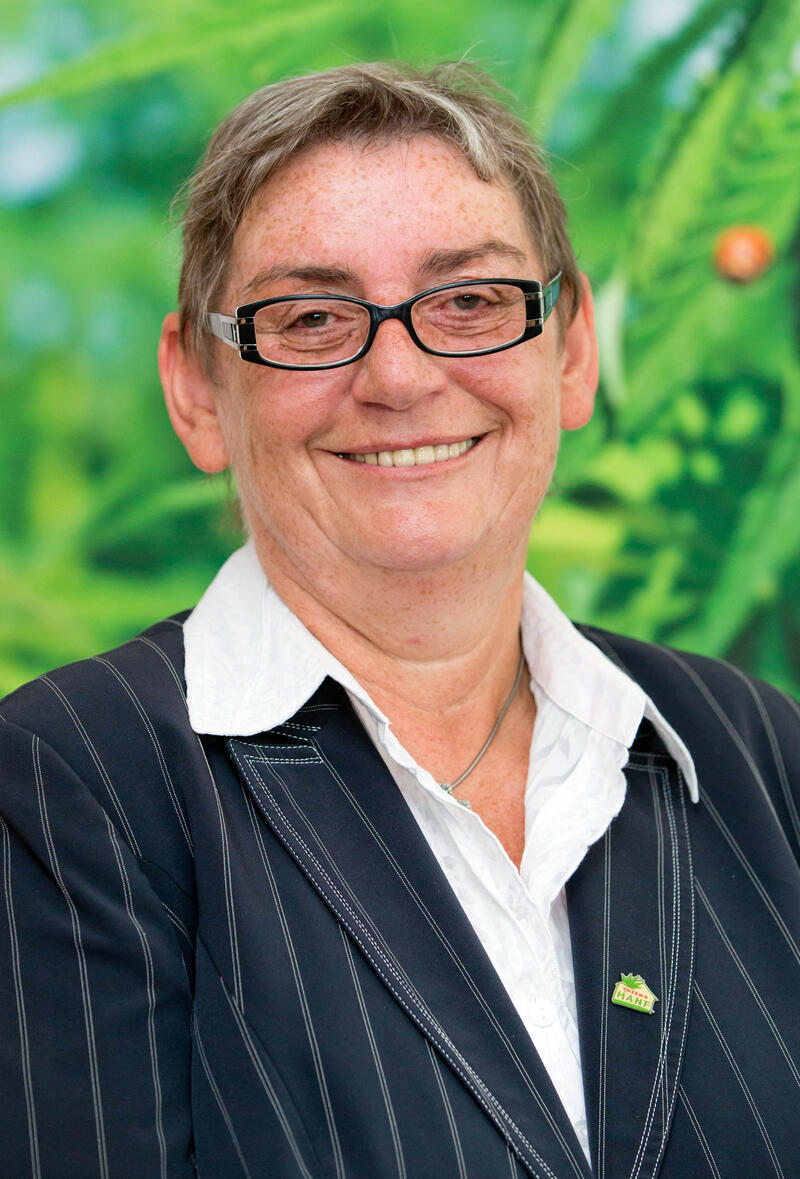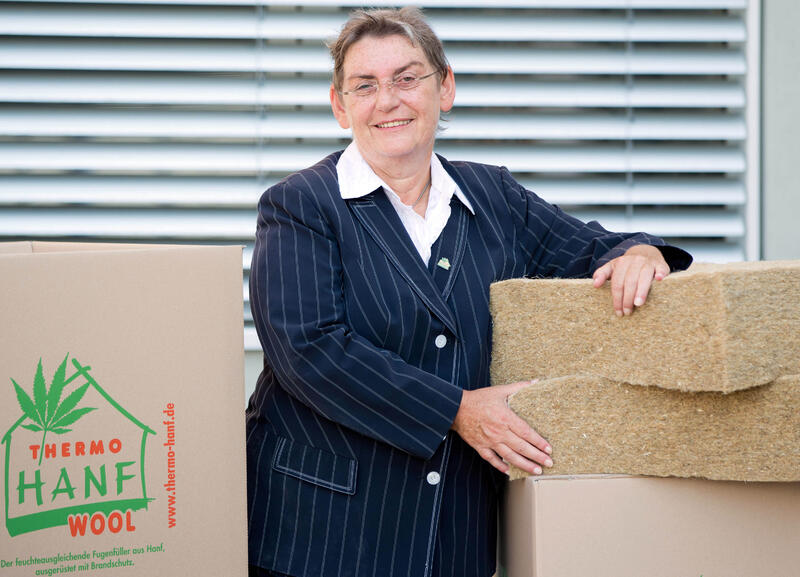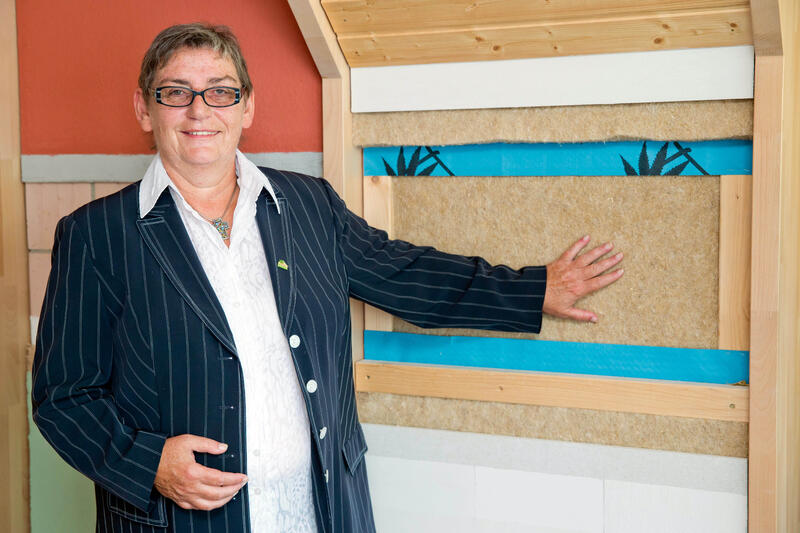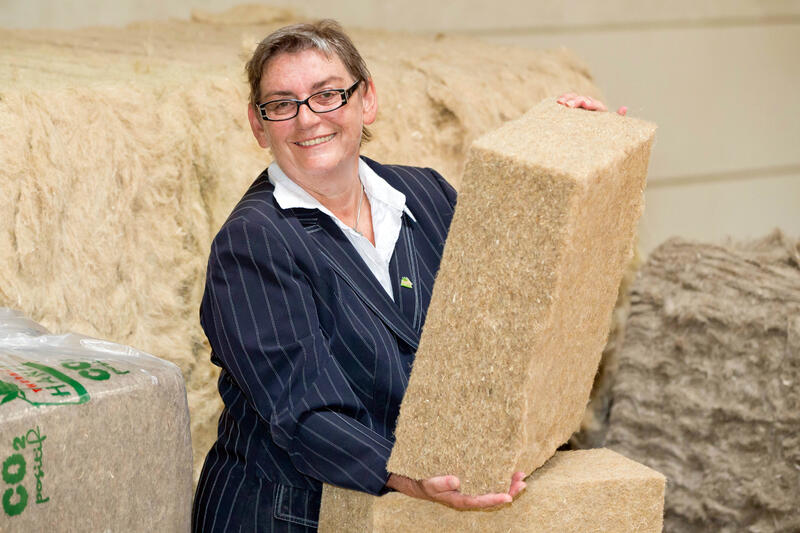Hock-Heyl has “hardheadedly made hemp handy for the house”
Nördlingen. “Without Carmen Hock-Heyl's visions, stubborn commitment, business acumen and courage to take risks, there wouldn't be any insulation batts made from the renewable raw material hemp being used in house construction, and no company that had established their place on the market.” - This is how Dr. Fritz Brickwedde, the Secretary General of the Deutsche Bundesstiftung Umwelt (DBU), today announced the presentation of the DBU's 2013 German Environmental Award to Carmen Hock-Heyl (58), inventor, company founder and manager of the firm Hock GmbH & Co. KG (Nördlingen). “Carmen Hock-Heyl has not just made eco-friendly insulation materials more accepted. She is also a model for other businesses because of the way she has successfully reconciled ecological and economic considerations, made it possible to build in a healthy way, and revived regional economic cycles,” Brickwedde said. German President Joachim Gauck will hand the award, worth 250,000 euros, to Hock-Heyl in Osnabrück on October 27.
“Exemplary, innovative business and ecological achievement”
“Your exemplary, innovative business and ecological achievement and the unique selling point of the company Hock is the production of insulation batts made of the renewable raw material hemp for roofs, walls, ceilings and facades,” Brickwedde said. However, he said, Hock-Heyl had to go down a long and laborious path in the face of much resistance before these thermo-hemp products went on the market. He described how she had completely revamped the entire process – from sowing and harvesting the hemp, and developing and producing the insulation batts, to recycling – advertised her products, invested a lot of money and done a lot of persuading. She had promoted sustainable and resource-saving insulation materials at a political level and in associations. In the end, Brickwedde said, an exemplary cycle of material and business arose that guaranteed the creation of value for all – if possible, regional – elements and participants involved, such as agriculture, fibre processing, production facilities, building materials trade, craftspeople and builder-owners.

© DBU/Daniel Karmann

© DBU/Daniel Karmann
Hemp batts: much lower energy consumption and produced without chemical substances or those harmful to health
Hock-Heyl, a trained doctor's assistant and paramedic, had the idea of producing ecological insulation materials in 1996. She describes how she had experienced at first hand the problems associated with installing conventional fibre-based insulation materials in the carpenters workshop run by her parents. “Glass and rock wool scratches and irritates the skin. And when you work above your head, fibre dust trickles down and irritates your eyes.” She wanted to find a way to prevent this. She got the idea of using hemp fibre as insulation from an acquaintance in the fibre-processing industry. “It is really a joke when people say that conventional insulation materials save energy when you look at the enormous amount of energy needed to manufacture these products,” Hock-Heyl criticized. Hemp batts, on the other hand, can be produced using much less energy and without chemical substances or those that are harmful to health.
The Hock company a market leader for natural insulation made of hemp with “Thermo-Hemp Premium”
After a year of research and development, the trademark “Thermo-Hemp” was registered in 1997, before the company Hock GmbH & Co. KG was founded in 1998 in Stutensee, near Karlsruhe, with Carmen Hock-Heyl as managing director. Since 2003, Brickwedde said, the company has been producing the batts itself, and in 2005, it moved – with its now around 60 workers – to Nördlingen in Bavaria. “Thermo-Hemp” products have been on the European market since 2006, he added, noting that the company Hock was now even a market leader for natural insulation materials made of hemp. Brickwedde stressed that these important steps, from having the idea to establishing thermo-hemp products in the building materials trade and processing plants, were all undertaken under Hock-Heyl's leadership. But Hock-Heyl herself says that it was a difficult process and that everyone had tried to talk her out of it, and she quotes Mahatma Gandhi: “At first they ignore you, then they laugh at you, then they fight you, and then you win.” She describes how she had been forced to fight hard as a woman in a man's world: “Competence and expertise were the only things that helped. I remained stubborn and continued to pursue my goal.”
“Completely compostable insulation material”
This approach has obviously paid off. The latest product of the company Hock is the completely bio-degradable thermal insulation material “Thermo-Hemp Plus”, whose development was sponsored by the DBU in 2007. As a result, the plastic support fibres that were previously used in the hemp batts could be replaced by biodegradable fibres made of corn starch, allowing the development of a completely compostable insulation material that insulates as effectively as the conventional hemp mats. In addition, the natural raw materials hemp and corn could be processed in an energy-saving manner. Brickwedde pointed out that because the hemp batts were cut to the required size, there was barely any waste and resources were protected – another benefit to the environment. He praised the way Hock-Heyl set very high ecological standards for her products, which she had regularly tested by independent research institutes.

© DBU/Daniel Karmann
“Unique returns policy”
Unlike the materials made of mineral wool or polystyrene that have been used in building up to now, hemp can be returned to the manufacturing company – for example, if a house is torn down –, processed and reused. Brickwedde: “The returns policy of the company Hock is unique. It means that future generations will have no problems or costs because of waste disposal: a true contribution to sustainability and the future practicality of biological construction and insulation materials.” He went on to describe how the hemp batts even had an advantage with regard to fire protection: the company Hock, he said, uses only sodium carbonate as a flame-retardant – a naturally occurring salt of carbonic acid that does not give off toxic fumes in case of fire. He added that hemp also provided a healthy and pleasant climate inside the building without any danger of mould, and the same quality of insulation against the cold and even better protection against heat in summer than conventional insulation materials.
Promoting building with products made from renewable raw materials
Brickwedde: “It was always Carmen Hock-Heyl's aim to do something for the sustainable protection of the climate and to continue to establish building methods using products made from renewable raw materials – such as hemp. It may be that there were phases when her efforts seemed to her like a Sisyphean task. And it certainly caused her pain to be at first ridiculed by the building industry. But with her courage, she finally succeeded in turning visions into reality: she has hardheadedly made hemp a handy building material for houses.”
“Use prize money to found an association for natural-fibre insulation materials”
Hock-Heyl says, however, that this is not the final fulfilment of her vision and the end of her work: “With the prize money from the German Environmental Award, I intend to found an association for insulation materials made of natural fibres to create a body representing all manufacturers of renewable insulation materials such as hemp, wool, flax or cellulose, who up to now have barely any voice in the economy and politics,” Hock-Heyl said. With regard to the future market and acceptance of biological insulation materials, she has great hopes that politicians will make such materials as obligatory as energy-saving light bulbs. “The German Environmental Award is an incentive for me to continue promoting the widespread use of environmentally friendly insulation materials,” Hock-Heyl said.

© DBU/Daniel Karmann